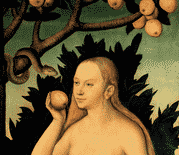Video: Eve – Is Woman a Misbegotten Male? (Thomas Aquinas vs. Aristotle)
This is going to be controversial! Today we look at the classical and medieval understandings of woman as she relates to man. We do so by looking at the Genesis account and along the way we get into some dicey theology.
 If you’re a rock-ribbed feminist, you may want to stop reading here. Just sayin’. Thomas Aquinas locks horns with Aristotle on this issue of “woman as misbegotten male.” I think you’ll find this video especially interesting and helpful as you engage with others who argue that “The story of Adam and Eve is misogynistic!” You’ll also learn about Thomas Aquinas’ philosophy. As always, I look forward to the comments!!!
If you’re a rock-ribbed feminist, you may want to stop reading here. Just sayin’. Thomas Aquinas locks horns with Aristotle on this issue of “woman as misbegotten male.” I think you’ll find this video especially interesting and helpful as you engage with others who argue that “The story of Adam and Eve is misogynistic!” You’ll also learn about Thomas Aquinas’ philosophy. As always, I look forward to the comments!!!
By the way this video is the last of a series of NSTI videos that we’ve been releasing for the past two weeks from the New Saint Thomas Institute.
[callout]Alert: TODAY (July 8) is the LAST DAY to sign up for the New Saint Thomas Institute.[/callout]
On Tuesday July 8 at 11:59pm the tuition will go from $37 to $47! This sale is only available for a few more hours. We will also close registration.
If you join before 11:59pm July 8 you will get all the amazing bonuses worth (over $119), a tuition rate cut, and the Certificate in Theology. And you get a 21 day full money back guarantee! This sale will never be available again. If you’ve thought about joining the New Saint Thomas Institute, this is the day. Do it before 11:59pm July 8. Click here to sign up and get the tuition sale before 11:50pm Tuesday July 8.
Here’s the video on: “Eve – Is Woman a Misbegotten Male? (Thomas Aquinas)”
[youtube id=”Y8t_VvrPfpE”]
You can get videos like this every week through the New Saint Thomas Institute
Here’s the mp3/audio version if you want to listen to it or download it:
Podcast: Play in new window | Download | Embed
What does “Eve” mean?
Eve comes from the Hebrew: חַוָּה, pronounced Havah or Hawah.
Eve in the Hebrew language is Ḥawwāh, meaning: “living one” or “source of life”, and is related to ḥāyâ, “to live”. The name derives from the Semitic root ḥyw.
Why the Rib? (STh I, q. 92, a. 3.)
Thomas Aquinas gives this account:
I answer that, It was right for the woman to be made from a rib of man.
First, to signify the social union of man and woman, for the woman should neither “use authority over man,” and so she was not made from his head; nor was it right for her to be subject to man’s contempt as his slave, and so she was not made from his feet.
Secondly, for the sacramental signification; for from the side of Christ sleeping on the Cross the Sacraments flowed–namely, blood and water–on which the Church was established.
Aristotle on “Female as Misbegotten Male”
Aristotle was a Greek philosopher before the time of Christ. He had been a student of Plato. Aristotle was brilliant and the rediscovery of Aristotle in the Middle Ages led to a renaissance in Christian, Jewish, and Muslim intellectual circles – especially in the fields of science.
While the Church Fathers taught “immediate” conception, Aristotle taught a “delayed” conception.
Consequently, Aristotle taught that “the female is a misbegotten male.” Aristotle, De Gener. ii, 3.
Thomas Aquinas depends on Aristotle quite a bit, but not slavishly. Thomas frequently points out where and why Aristotle is wrong on hundreds of points. So it is interesting to see Thomas wrestle with Aristotle on the “status” of women in the scope of creation. Here’s the answer from Thomas Aquinas (it’s in more detail in the video lesson):
“Reply to Objection 1. As regards the individual nature, woman is defective and misbegotten, for the active force in the male seed tends to the production of a perfect likeness in the masculine sex; while the production of woman comes from defect in the active force or from some material indisposition, or even from some external influence; such as that of a south wind, which is moist, as the Philosopher observes (De Gener. Animal. iv, 2). On the other hand, as regards human nature in general, woman is not misbegotten, but is included in nature’s intention as directed to the work of generation. Now the general intention of nature depends on God, Who is the universal Author of nature. Therefore, in producing nature, God formed not only the male but also the female.” STh I, q. 92, 1, ad 2.
Here’s how Thomas understands it: From the Aristotelian point of view of philosophical act and potency, an embryonic female is just a little less actualized (XX chromosome) than a male (XY). But Thomas says, “on the other hand,” from the biblical Judeo-Christian point of view woman is NOT a misbegotten male. She is integral to the fabric of creation.
[reminder]So let’s get the comments rolling! What do you think? Does Thomas handle this appropriately? Does he not go far enough?[/reminder]
What to Watch Next
SHOP THE TAYLOR MARSHALL STORE
Dive Deeper

GET CONFIDENT IN YOUR FAITH
Explore the fascinating world of Catholic teachings with Dr. Marshall. Together you’ll unpack the brilliant answers the Church gives to tough questions about the Faith. The best part: you go at your own pace. Start this exciting journey today.


 >
>


